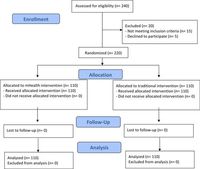Promoting healthy lifestyles is essential for preventing chronic diseases, yet a vast majority of university students regularly engage in unhealthy habits. Utilizing mobile smart devices for health interventions, known as mHealth, which integrate behavioral change theories with environmental interaction, offers a promising and cost-effective strategy to encourage lasting adoption of healthier habits. A recent study compared the effectiveness of the mHealth intervention program with a traditional face-to-face program in fostering healthy lifestyle changes among nursing students, revealing significant advantages for the former.
The study was conducted among 220 nursing students at Zagazig University, with participants evenly divided between the mHealth and traditional programs. Data collection took place from May to December 2023 using established questionnaires, including the Global/International Physical Activity Questionnaire (GPAQ/IPAQ) for assessing physical activity levels, a Food Frequency Questionnaire (FFQ) for dietary habits, and a Sleep Quality Scale (SQS) to evaluate sleep quality. After three months of implementing the educational programs, greater lifestyle improvements were observed in the mHealth group compared to their counterparts in the traditional program.
The findings serve as a critical reminder of the pervasive challenges university students face regarding health choices. In Egypt, for example, about one-third of adults experience high blood pressure, and nearly half of the adult male population smokes. Furthermore, the high prevalence of obesity and physical inactivity in this demographic draws attention to the urgent need for effective interventions. In particular, a staggering 28% of men and 22% of women aged 15 to 69 are reported as obese.
While the shift to university life often correlates with unhealthy eating habits and lack of physical activity, the research underscores the potential benefits of the mHealth approach to promote healthier behaviors. By leveraging mobile technology, students can receive real-time feedback on their lifestyle choices and keep track of their goals, which can foster a sense of community support through social networking platforms.
In this randomized controlled trial, students were selected based on specific criteria: they were aged between 19 and 24, had a BMI over 18.5, engaged in physical activities using smartphones, and were prepared to utilize social media platforms throughout the study. In total, 220 students participated, contributing to what has become a pivotal exploration of the effectiveness of health promotion interventions.
Post-intervention analyses revealed that the mHealth program participants reported notable increases in physical activity, improved dietary choices, and enhanced sleep quality, demonstrating the approach's effectiveness. The study team noted that while both the mHealth and traditional groups exhibited improvements, participants in the mHealth group experienced greater changes. The post-intervention assessments validated these outcomes, revealing that the mHealth group's scores in the Global Physical Activity Questionnaire (IPAQ), Food Frequency Questionnaire (FFQ), and Sleep Quality Scale (SQS) were statistically significant.
Interestingly, while statistically insignificant changes were recorded regarding body mass index (BMI) between both groups, there was a noteworthy improvement in blood pressure levels. The systolic blood pressure of both the mHealth and traditional groups improved significantly, with the mHealth program yielding slightly better results. The findings suggest that mHealth approaches could play an invaluable role in cardiovascular health improvements, essential for mitigating risks associated with chronic conditions.
Moreover, the intervention's effect on cholesterol levels also highlighted mHealth's capacity to influence significant health metrics, as reductions in total cholesterol and low-density lipoprotein (LDL) were reported in both groups post-intervention. Comparison of results showed the mHealth group experienced significantly more substantial improvements in these areas than the traditional group.
This comprehensive examination of mHealth deployment in health promotion among university nursing students brings forth several pivotal considerations. Data obtained reflect not only an enhancement in physical activity levels and improvements in dietary choices but also indicate favorable outcomes regarding broader health risk factors relevant to public health.
In conclusion, the mHealth intervention program has shown to be a compelling avenue for prompting positive lifestyle changes among nursing students. As mobile technology and health interventions continue to converge, the potential for enhancing health literacy, boosting engagement in healthy practices, and improving overall well-being among students remains profound. Moving forward, further research across diverse populations may yield additional insights for public health strategies aimed at achieving long-lasting impacts.

